3. European Evolution.
In Europe as in Japan, the public performance of music began in the context of religious ritual. Although materials
are sparse and difficult to decipher, we have hymns to the gods dating back to pre-classical days. We have the
texts of several Greek tragedies performed at religious festivals, and just enough information about their music to
conjecture how they might have been performed. Hour One of the class explores various modern reconstructions of
Greek drama and one striking attempt to distil its ethos in a new work.
The second hour is in two parts. First, the parallel story of music drama in the Christian church, beginning with
simple reenactments of moments from the Bible; these grew into substantial musical plays, where the church itself
is the theater. Then we turn to composed music in a more popular vein, to sometimes sacred but more often secular
themes—pieces whose complexity and virtuoso requirements presuppose professional performance in a noble court,
hence a different kind of “music on the stage.”
rb.
The script, videos, and images will be posted immediately after class.
All the clips I showed are available on YouTube, except my short titles. The Greek plays are all complete, but cued to
where we started in class. None have added titles, however, and the Stravinsky Oedipus Rex unfortunately has Spanish
titles burned in. I added bonus versions of the last three items, either montages I made myself for another course, or
something else I thought you'd enjoy; these are all *asterisked. rb.
| A. SONGS OF PRAISE |
| |
Hurrian Hymns |
|
* Hymn #6 to Nikkal
(Peter Pringle)
|
| |
Greek Music |
|
* Demo by Armand d'Argour
|
| |
| B. THE PLAY'S THE THING |
| |
Euripides: Herakles |
|
* Choral ode
(Barnard College, 2019)
|
| |
Aeschylus: Agamemnon |
|
* First choral scene, start
(unknown production from Greece)
* First choral scene, end
(Peter Hall, National Theatre, 1981)
|
| |
Euripides: The Trojan Women |
|
* Talthybius and Andromache
(film by Michael Cacoyannis, 1971)
|
| |
| C. STRAVINSKY'S OEDIPUS |
| |
Stravinsky/Cocteau: Oedipus Rex |
|
* Julie Taymor, Tokyo 1992: ending
(Spanish titles)
* Trailer (with Samy Moussa: Antigone)
(Netherlands Opera, 2024)
|
| |
| D. THE CHURCH AS THEATER |
| |
Documentary: Early English Drama |
|
* The Quem quaeritis trope
|
| |
Hildegard: Ordo Virtutum |
|
* First scene with the Devil
(The Song Co.)
* Defeat of the Devil
(from von Trotta film Vision)
|
| |
The Play of Daniel |
|
* The writing on the wall
(Cloisters, NYC 2008, no titles)
|
| |
| E. FROM CHURCH TO COURT |
| |
Cantigas de Santa Maria |
|
* Rosa das Rosas
(singer uncredited)
* Rosa das Rosas
(Ensemble Galatia)
|
| |
Lorenzo da Firenze |
|
* A poste messe, with score
* A poste messe, my montage
(with Lorenztti: Good Government)
|
| |
Clément Jannequin |
|
* La Guerre, concert performance
(Kings' Singers)
* La Guerre, my montage
(with pictures and titles)
|
| |
Ardiaan Willaert |
|
* Vecchie letrose, as played in class
(Jordi Savall concert)
* Vecchie letrose, another version
(acted out by lively Italian choir)
* Vecchie letrose, my montage
(with Bruegel Seasons)
|
| |
|
|
|
|
|
| IMAGES |
The thumbnails below cover the slides shown in class, though
there may be a few small discrepancies. Click the thumbnail to see a larger image.
Click on the right
or left of the larger picture to go forward or back, or outside it to close. |
 | |
 | |
 | |
 | |
 | |
 | |
 | |
 | |
 | |
 | |
 | |
 | |
 | |
 | |
 | |
 | |
 | |
 | |
 | |
 | |
 | |
 | |
 | |
 | |
Here are brief bios of the artists, composers, and writers considered in the class, listed in order of birth.
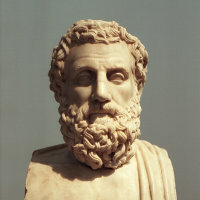 |
Aeschylus, 535–455 BCE. Greek playwright.
As a young man, Aeschylus fought in the battles of Marathon and Salamis, references to which inform his play The Persians, one of the very few Greek dramas to deal with contemporary events. He is the earliest of the celebrated tragedians (with Sophocles and Euripides), and his Oresteia is the only surviving set of Greek plays written to be performed together as a trilogy.
|
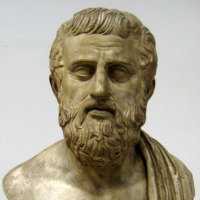 |
Sophocles, 497–406 BCE. Greek playwright.
Sophocles wrote over 120 plays, but only 7 have survived in full. Among these, however, are Oedipus Rex and Antigone, two of the cornerstones of Greek Tragedy.
|
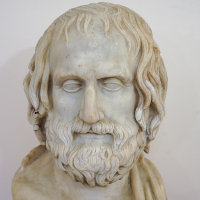 |
Euripides, 480–406 BCE. Greek playwright.
"Along with Aeschylus and Sophocles, Euripides is one of the three ancient Greek tragedians for whom any plays have survived in full [18]. He is identified with theatrical innovations that have profoundly influenced drama down to modern times, especially in the representation of traditional, mythical heroes as ordinary people in extraordinary circumstances." [Wikipedia]
|
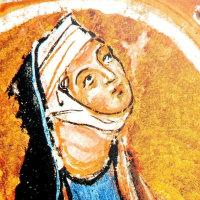 |
Hildegard von Bingen, 1098–1179. German polymath.
Abbess of the monastery of Rupertsberg on the Rhine, and composer of the music drama Ordo Virtutum, she achieved extraordinary fame as a theologian, poet, composer, manuscript illuminator, and natural scientist, becoming known as "The Sibyl of the Rhine." The Catholic Church has long revered her as a saint.
|
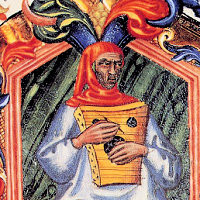 |
Lorenzo da Firenze, 1300–72. Italian composer.
He is represented in the Squarcialupi Codex, one of the principal sources for Italian music in the 14th century, by 16 pieces, but little is known about his life.
|
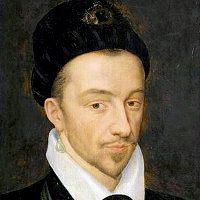 |
Clément Jannequin, 1475–1560. French composer.
Most of Janequin's large output consisted of secular chansons, often with striking onomatopoeic imitation of their subjects, which made him exceptionally popular in his day.
|
 |
Adrian Willaert, 1490–1562. Netherlandish composer.
Willaert's music traveled to Italy before he himself did, at the age of 25. But that was where he spent the rest of his career, in court appointments in Ferrara and Milan, and latterly as maestro di cappella of St. Mark's in Venice, becoming the founder of an important musical tradition that was to last through the 17th century. He also composed many secular compositions to Italian texts.
|
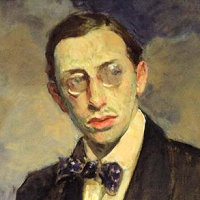 |
Igor Stravinsky, 1882–1971. Russian-American composer.
Starting as an enfant terrible in Paris with the ballets he wrote for Serge Diaghilev, he gradually pared back his resources, developing a neo-classical style between about 1930 and 1955, but eventually turning his back on tonality.
|
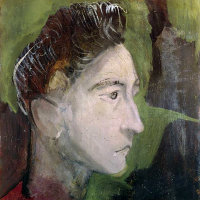 |
Jean Cocteau, 1889–1963. French writer, artist, and filmmaker.
Cocteau's influence on the arts in France in the earlier 20th century was pervasive, extending to most media. In terms only of classical myth, he wrote the text to Stravinsky's Oedipus Rex in 1927 and directed a trio of films based on the Orpheus legend in 1930, 1950, and 1960.
|
 |
Julie Taymor, 1952– . American director, designer, and filmmaker.
Taymor studied mime in Paris, physical theater in New York, and Asian arts in Seattle all before graduating from Oberlin. After graduation, she spent two years in Japan and Indonesia, both learning traditional skills from others and developing her own company. These experiences have been the root of her signature mixed-media style, as seen in such productions as The Lion King (1997) on Broadway and The Magic Flute (2005) for the Met.
|
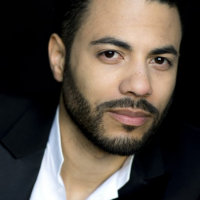 |
Samy Moussa, 1984– . Canadian conductor and composer.
Born in Montreal, Moussa then moved to Munich to study conducting. He became music director of the INDEX Ensemble in Munich in 2010, and remains based in that city, although his conducting career and performance of his compositions have given him international exposure.
|




































